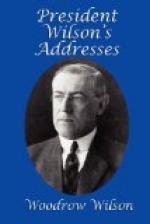The opinion of the world is the mistress of the world; and the processes of international law are the slow processes by which opinion works its will. What impresses me is the constant thought that that is the tribunal at the bar of which we all sit. I would call your attention, incidentally, to the circumstance that it does not observe the ordinary rules of evidence; which has sometimes suggested to me that the ordinary rules of evidence had shown some signs of growing antique. Everything, rumor included, is heard in this court, and the standard of judgment is not so much the character of the testimony as the character of the witness. The motives are disclosed, the purposes are conjectured, and that opinion is finally accepted which seems to be, not the best founded in law, perhaps, but the best founded in integrity of character and of morals. That is the process which is slowly working its will upon the world; and what we should be watchful of is not so much jealous interests as sound principles of action. The disinterested course is always the biggest course to pursue not only, but it is in the long run the most profitable course to pursue. If you can establish your character, you can establish your credit.
What I wanted to suggest to this association, in bidding them very hearty welcome to the city, is whether we sufficiently apply these same ideas to the body of municipal law which we seek to administer. Citations seem to play so much larger a role now than principle. There was a time when the thoughtful eye of the judge rested upon the changes of social circumstances and almost palpably saw the law arise out of human life. Have we got to a time when the only way to change law is by statute? The changing of law by statute seems to me like mending a garment with a patch, whereas law should grow by the life that is in it, not by the life that is outside of it.
I once said to a lawyer with whom I was discussing some question of precedent, and in whose presence I was venturing to doubt the rational validity, at any rate, of the particular precedents he cited, “After all, isn’t our object justice?” And he said, “God forbid! We should be very much confused if we made that our standard. Our standard is to find out what the rule has been and how the rule that has been applies to the case that is.” I should hate to think that the law was based entirely upon “has beens.” I should hate to think that the law did not derive its impulse from looking forward rather than from looking backward, or, rather, that it did not derive its instruction from looking about and seeing what the circumstances of man actually are and what the impulses of justice necessarily are.




